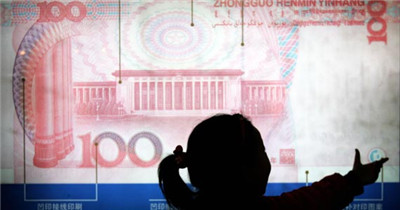(单词翻译:单击)
Come June, the International Monetary Fund will probably decide to include the Chinese renminbi in its special drawing rights (SDR).
6月将至,国际货币基金组织(IMF)很可能将决定把人民币纳入其特别提款权(SDR)货币篮子。
Though the move is largely symbolic, the symbolism is huge. It is another acknowledgment of China’s growing stature in the global economy and financial markets. It is also a marker underscoring how swiftly China is moving to dismantle capital controls, in line with the reform policies of the People’s Bank of China.
尽管此举主要是象征性的,但象征的意义却很大。这是对中国在全球经济和金融市场中地位不断上升的再次认可。这也是一种标志,突显出中国正多么迅速地按照中国央行的改革政策,采取措施解除资本管制。

That in turn has implications for investors. It will mean China could soon assume an even larger weight in crucial global financial markets. For example, today, China is a mere 2.5 per cent of the MSCI All Country World Index, based on Chinese companies listed in Hong Kong. But, when the powers that be decide the currency is convertible enough, onshore Chinese shares could be included in the index, which means its share of the index could rise to more than 10 per cent, according to Michael Cembalest of JPMorgan Asset Management.
这进而会对投资者产生影响。此举将意味着,不久之后中国可能会在关键的全球金融市场中占据越来越大的权重。举例来说,目前中国在摩根士丹利资本国际全球指数(MSCI All-Country World Index)中的权重仅为2.5%,这个数字是基于在香港上市的H股得出的。但是,当权威人士认定人民币可兑换性已足够强时,A股可能会被纳入该指数。摩根大通资产管理公司(JPMorgan Asset Management)的迈克尔•琴巴莱斯特(Michael Cembalest)表示,这意味着中国在该指数中所占权重可能会升至10%以上。
Today, the renminbi is most visible as the currency in which a growing portion of Chinese trade is denominated. Chinese companies often offer more attractive prices and financing to counterparts that will trade in renminbi, thereby eliminating their own foreign exchange risk.
如今,随着中国对外贸易中以人民币计价的比例越来越高,人民币已成为最常用的支付货币之一。中国企业经常向贸易对象提供更具吸引力的价格和融资、换取对方采用人民币结算,从而消除自身的汇率风险。
More importantly, the renminbi is also growing in stature as an investable currency. Today, Mr Cembalest adds, central banks and sovereign wealth funds have invested between Rmb300bn and Rmb400bn in renminbi-denominated assets. While most of these are in Asia, the European Central Bank has also said it is considering investing in such assets.
更重要的是,人民币作为可投资货币的地位也在上升。琴巴莱斯特补充称,如今,各国央行和主权财富基金投资的人民币计价资产在3000亿至4000亿元人民币之间。这些机构大多来自亚洲,不过,欧洲央行(ECB)也表示正考虑投资人民币资产。
Moreover, Japanese central bankers say they are considering agreements whereby the Bank of Japan and the PBoC would expand investing in each other’s government bond markets (assuming the forthcoming anniversary of the end of the second world war does not lead to a new outbreak of hostilities between the two countries). The two central banks are also considering resuming swap lines. China already has almost Rmb10tn of such arrangements with 30 central banks.
此外,日本央行(BoJ)官员表示,他们正考虑与中国央行达成协议,扩大对彼此国债的投资(前提是即将到来的二战结束周年纪念活动不导致两国之间爆发新的对抗)。这两国的央行还在考虑恢复货币互换。中国已与30家央行达成了规模近10万亿元人民币的货币互换协议。
Meanwhile, China’s young asset management groups and securities firms are designing ever more products in local currency both onshore and offshore, where Rmb2tn in deposits sits, most of them in Hong Kong.
同时,中国年轻的资产管理集团和券商正在设计更多以本币计价的在岸和离岸产品。离岸人民币存款规模达2万亿元人民币,其中大多数位于香港。
China does not have to remove all controls on its currency, particularly rules on portfolio investment flows, for it to qualify for inclusion in the IMF basket. Even today, only four items out of 40, or less than 15 per cent of the capital account, have restrictions, according to Qu Hongbin, chief China economist for HSBC in Hong Kong. After all, even Singapore and Hong Kong retain some constraints on their currencies. The Chinese government’s willingness to remove restrictions on the renminbi comes in the face of widespread fears, especially outside China, of slowing economic growth on the mainland and of a possible debt crisis, given the fact that debt in China has grown by 70 per cent since the global financial crisis in 2008.
取消对人民币的一切管制、特别是针对证券投资流动的规定,并非人民币够格被纳入IMF货币篮子的必要条件。驻香港的汇丰(HSBC)首席中国经济学家屈宏斌表示,即便是现在,人民币资本项目40个子项中也只有4个(也就是不到15%)不可兑换。毕竟,就连新加坡和香港也对自己的货币保留了部分限制。在人们、尤其是中国以外的人们对中国内地经济增长放缓和可能爆发的债务危机(2008年全球金融危机以来中国的债务增加了70%)普遍感到担忧之际,中国政府还是展现出了解除人民币管制的意愿。
The combination of offshore flows from various conglomerates and diminishing returns on domestic investment suggests that as China lifts controls, at least over a short period of time, the renminbi will lose value. After all, in the past three quarters, there has been about $333bn in outflows of hot money from China, (much of them from companies hedging or repaying their dollar debt). Moreover, reserves, which ended the year at $3.8tn, declined to $3.73tn at the end of the first quarter.
形形色色的企业集团将资金转往海外,而国内投资回报又不断下降,这两点结合在一起,意味着假如中国解除人民币管制,人民币至少在短期内将会贬值。毕竟,过去3个季度,有大约3330亿美元热钱流出了中国(许多都是通过企业对冲或偿还美元债务的方式流出的)。此外,截至今年一季度末,中国外汇储备从去年底的3.8万亿美元降至3.73万亿美元。
So far, the renminbi has been one of the few currencies to hold its value against the dollar in a world of increasing competitive devaluations. China has recently started to ease monetary policy, but is trying to do so in a more measured way than either Japan or Europe. A one-time competitive devaluation to support exports is less attractive to the Chinese than the gradual appreciation that makes its currency attractive as a store of value. The growing legitimacy of the renminbi also comes at a time when the rest of the world is looking for a credible alternative to the dollar as the only real reserve currency. Cliff Tan, MUFG economist, jokes that the acronym SDR should stand for “some day renminbi”. That “some day” is fast approaching.
在世界各国的竞争性货币贬值愈演愈烈之际,人民币迄今为止是少数几个相对美元币值保持坚挺的货币之一。中国最近开始放松货币政策,但相对于日本或欧洲,中国在努力以更谨慎的方式做这件事。对中国来说,与其实施一次性的竞争性贬值以支持出口,不如缓慢升值以增加人民币作为价值储藏手段的吸引力。此外,人民币正统地位日益增强的同时,世界其余国家正在寻找美元的可靠替代品,以作为唯一的实际储备货币。三菱日联金融集团(MUFG)经济学家陈仲华(Cliff Tan)戏称,SDR这个英文缩写应该代表“some day renminbi(有朝一日将是人民币)”。这一天正迅速临近。


